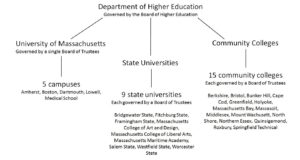After the recent closure of Mount Ida and its acquisition by UMass Amherst, we have received questions about how this decision was made and the authority that UMass has to make this kind of decision. This post is intended to explain the structure of UMass, and their relationship with the Board of Higher Education and other state universities and community colleges.
Public higher education in Massachusetts consists of community colleges, state universities, and the UMass system. Overall, it is structured like this:

The Department of Higher Education has developed this concise comparison of the authorities of the UMass Board of Trustees, the Board of Higher Education, and the boards of trustees of community colleges and state universities.
The Department of Higher Education
Institutions of higher education in the Commonwealth are generally regulated by the Department of Higher Education, and its Board. The Board of Higher Education has 13 voting members, including nine appointed by the governor, the Secretary of Education, and one each from the UMass Board of Trustees, a board of trustees of a state university, and a board of trustees of a community college.
For example, and perhaps most importantly, the Board gives institutions the authority to grant degrees, and to call themselves “colleges” or “universities.” The Department of Higher Education also has to approve public colleges’ and universities’ five-year plans, submit budget requests on behalf of the system of public higher education, approve the start of new academic programs, and approve the admissions standards for UMass and the state universities and community colleges, among other things. For more information on powers and responsibilities of the Department of Higher Education, relevant laws and regulations are listed here.
The University of Massachusetts
In 1991, the current five UMass campuses were combined into a single state university system. UMass is governed by a Board of Trustees, which has the authority to make major decisions for all of the five campuses. The Board of Trustees can delegate responsibility to university presidents, chancellors, deans, etc. as needed. The nineteen voting members of the Board of Trustees include sixteen appointed by the governor, the Secretary of Education, and two UMass undergraduate students.
In general, the UMass Board of Trustees is given broad authority, including: “all authority, responsibility, rights, privileges, powers and duties customarily and traditionally exercised by governing boards of institutions of higher learning.” An opinion of the Attorney General in 1977 reiterated that the University of Massachusetts had broad authority over its purchasing decisions, as “academic freedom is intimately related to fiscal independence” (see page 137). In other words, the freedom afforded to the UMass Board of Trustees is an intentional effort to protect UMass as an academic institution. The UMass trustees do have to, for example, submit a budget, but it is not subject to approval of any state body.
Information from past meetings of the UMass Board of Trustees can be found here.
State Universities and Community Colleges
The boards of trustees of each of the state universities and community colleges have many of the same powers and responsibilities as the UMass Board of Trustees, including, for example, developing institutional mission statements, establishing student fees, and setting standards for graduation. Each of these boards of trustees is to have 11 members, including ten appointed by the governor and one undergraduate student at that school.
In some areas the Board of Higher Education exercises different authority over state universities and community colleges than over UMass. For instance, the Board of Higher Education has “overall responsibility for the property, real and personal, occupied or owned by the [Board of Higher Education], state universities and community colleges,” but UMass has this authority for their own property. Relatedly, UMass has their own building authority, whereas all of the state universities and community colleges use the Massachusetts State College Building Authority to finance, construct, and oversee their residence halls and student activity facilities. These building authorities have their charges authorized by the UMass Board of Trustees and the Board of Higher Education, respectively.
Private Institutions of Higher Education
The Board of Higher Education has some authority over private colleges and universities, including giving them degree granting authority and helping to facilitate transfers of students between schools.
Relevant to the Mount Ida situation is that the Board of Higher Education does have to approve all closure plans of colleges and universities. The closure plan may, for example, include what will happen to current students at the closing institution, and what will happen to the records of current and past students.
